|
|
|
Sort Order |
|
|
|
Items / Page
|
|
|
|
|
|
|
| Srl | Item |
| 1 |
ID:
172651
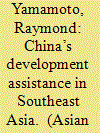

|
|
|
|
|
| Summary/Abstract |
China’s growing development assistance has become commonly perceived as a threat to the autonomy and development of Southeast Asian countries that had promoted by Japan in the past. This paper challenges that understanding by comparing China’s development assistance with Japan’s engagement in the region. The comparison supports an alternative perspective, which sees Chinese development assistance as favorable for Japan’s interests.
|
|
|
|
|
|
|
|
|
|
|
|
|
|
|
|
| 2 |
ID:
093954
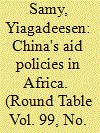

|
|
|
|
|
| Publication |
2010.
|
| Summary/Abstract |
Since the Beijing Summit of the Forum on China-Africa Co-operation in 2006, China's renewed interest in Africa has garnered a lot of attention and generated a lot of debate. Western media and analysts have, perhaps not surprisingly, been generally very critical of China's rising influence in Africa. The African reaction, however, has been more mixed. African leaders have welcomed what they see as a new approach to development and increased potential for meaningful South-South co-operation. African civil society groups have been more cautious and are worried about the possible negative repercussions on governance, the environment, human rights and overall economic development. This paper focuses on Chinese foreign aid to Africa and discusses the opportunities and challenges that it presents for China, the African continent, and the international community. This allows the uncovering of many misconceptions regarding the potential impact (whether positive or negative) of this renewed interest by different parties. The paper argues that if one adopts an approach that puts ordinary Africans first, at the centre of development, then the only option available to us is to engage China in a constructive partnership in order to make its aid effective.
|
|
|
|
|
|
|
|
|
|
|
|
|
|
|
|
| 3 |
ID:
167052
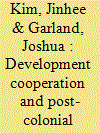

|
|
|
|
|
| Summary/Abstract |
With the rise of the South–South Development Cooperation (SSDC), the international development community has entered into a new paradigm of development cooperation. The Organisation for Economic Co-operation and Development – Development Assistance Committee (OECD-DAC) has had to consider what recently added members might have to offer, particularly South Korea given its dramatic transformation from official development assistance (ODA) recipient to donor. Post-colonial theory sees ODA as a system that reinforces the traditional hierarchy of North–South relations and reaffirms the hegemony of dominant countries; the SSDC has faced similar neo-colonial allegations. By employing post-colonial theory this paper investigates some neo-colonial criticisms of the ODA activities of major OECD-DAC and SSDC providers, before turning its focus on those of South Korea to determine whether it does indeed offer an alternative strategy to development. The African region was chosen as the focus in light of the increased amount of aid South Korea has allocated to the region. This paper concludes by offering a different role South Korea might play engaging within the OECD-DAC/SSDC context.
|
|
|
|
|
|
|
|
|
|
|
|
|
|
|
|
| 4 |
ID:
085716
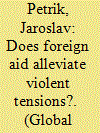

|
|
|
|
|
| Publication |
2008.
|
| Summary/Abstract |
Throughout most of its history, donors have perceived official development assistance (ODA) as a potentially helpful and mostly harmless form of intervention. Despite some destructive consequences, it was not until the late 1990s when the donor community realised that badly designed and insensitively implemented ODA can be just as disastrous to the recipient society as poorly executed military interventions or indiscriminate economic sanctions. Increasing interest in the impact of economic assistance on conflict made all major donor agencies adopt guidelines to avoid harming recipient societies and to maximise the positive impact of their aid on peace. This paper summarises the key literature on the role of ODA in ongoing conflicts as well as in times of peace, focusing on the influence of aid on violent tensions in the recipient societies. It traces the evolution of ideas which led to the recognition that aid can do harm. It argues that many of these connections, seemingly obvious, are unclear and likely to produce unmet expectations, and hence frustration.
|
|
|
|
|
|
|
|
|
|
|
|
|
|
|
|
| 5 |
ID:
136053
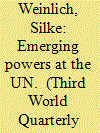

|
|
|
|
|
| Summary/Abstract |
The economic rise of China, India, South Africa, and Brazil has turned these countries into important providers of development assistance. While they seem increasingly comfortable in their bilateral relations with other developing countries, they are struggling to adapt their position within global institutions such as the United Nations. Do they turn their increased weight into a greater influence at the UN, and if not, why not? This article analyses financial contributions and political positioning at the UN in the area of development. Despite small changes, the four countries mostly insist on keeping their traditional status as recipients and ‘ordinary’ developing countries. This reservation can be explained in two ways: first, a more explicit leadership creates political and material costs that outweigh the potential benefits. Second, their shared experiences as developing countries make it hard to break ranks at the UN.
|
|
|
|
|
|
|
|
|
|
|
|
|
|
|
|
| 6 |
ID:
072678
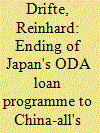

|
|
|
|
|
| Publication |
2006.
|
| Summary/Abstract |
Official Development Assistance has been the most important instrument of Japan's foreign policy towards China since 1979 and has been useful in softening many difficulties in the bilateral relationship. Most of Japan's ODA to China consists of yen loans. Usually the Japanese government adheres to certain economic indicators set by the international banking institutions in order to phase out ODA programmes. However, in 2005 the Japanese government decided abruptly without applying the usual guidelines to end its loan aid to China by 2008, the year China will stage the Olympic Games. The article concludes that the decision was taken for political reasons, taking into consideration the criticism of certain Chinese policies, the deterioration of Japan's relations with China, the fast economic development of China with its implications for Japan's interests, and a general aid fatigue of public opinion against the backdrop of Japan's economic and budgetary problems. The process leading to this decision throws an additional light on all the complexities of the bilateral relationship, including the historical legacy.
|
|
|
|
|
|
|
|
|
|
|
|
|
|
|
|
| 7 |
ID:
120959
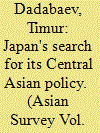

|
|
|
|
|
| Publication |
2013.
|
| Summary/Abstract |
In contrast to the claims that Japanese foreign policy increasingly shifts toward realist and pragmatic modes of engagement, this paper argues that Japanese foreign policy is largely trapped between idealist and pragmatic criteria in its Central Asian (CA) policy. Japan's policy in CA is thus a hybrid of policies that are not properly understood in CA, nor can they be explained to the public at home.
|
|
|
|
|
|
|
|
|
|
|
|
|
|
|
|
| 8 |
ID:
098439
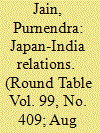

|
|
|
|
|
| Publication |
2010.
|
| Summary/Abstract |
Despite the absence of ill-will between Japan and India for most of the period since the end of World War II, bilateral relations have not reached their full potential in any field-political, economic or socio-cultural. This article identifies peaks and troughs across the six decades of post-war relations, first in the early post-war period and again in the mid-1980s. More recently, the nadir following India's nuclear testing in 1998 was followed by significantly improved relations in the early 2000s, with the relationship reaching its post-war best in most areas when Abe Shinzo (2006-07) was Japan's prime minister. This article considers both domestic and external factors that have caused these peaks and troughs. The final section considers the near future of the bilateral relationship as a new government led by the Democratic Party of Japan came to power in September 2009, replacing the long-term political monopoly of the Liberal Democratic Party.
|
|
|
|
|
|
|
|
|
|
|
|
|
|
|
|
| 9 |
ID:
077274
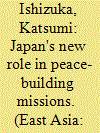

|
|
|
| 10 |
ID:
082232
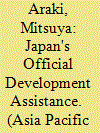

|
|
|
|
|
| Publication |
2008.
|
| Summary/Abstract |
This paper traces the history of Japan's Official Development Assistance centered in Southeast Asia through the decades from the 1960s to the 2000s. The characteristics of the "Japan ODA model" are examined and three conditions for economic growth generated by ODA are proposed. Whether or not the "Japan ODA model" is applicable in other regions is also discussed.
|
|
|
|
|
|
|
|
|
|
|
|
|
|
|
|
| 11 |
ID:
147744
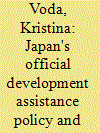

|
|
|
|
|
| Summary/Abstract |
The author analyzes changes in Japan's Official Development Assistance (ODA) policy in terms of maintaining peace and security. She describes the main theoretical approaches to analysis of Japan's development support policy; gives an overview of ODA Charters; observes Japan's efforts toward building up capabilities in the field of defense and security in order to increase Japan's contribution to global development and enhance its influence in international affairs.
|
|
|
|
|
|
|
|
|
|
|
|
|
|
|
|
| 12 |
ID:
185980
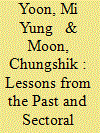

|
|
|
|
|
| Summary/Abstract |
As a donor, the Republic of Korea emphasizes five sectors as primary targets for official development assistance—education, health, governance, agriculture, and industry and energy—which contributed to its own rapid economic growth; that is, the country uses its own development experience as a development assistance model. This study examines the determinants of Korean ODA allocation for each of these sectors. We hypothesize that Korea is likely to allocate more targeted ODA to countries with less achievement in these sectors, and that this tendency is stronger for low-income countries. Using disaggregated Korean ODA allocation data for 2006 to 2015, we find that while the income of recipient countries generally has a significant effect on the allocation of ODA to each sector, the level of development of that particular sector does not appear to have systematic effects on allocations. This null finding may be due to the lack of coordination among the country’s many ODA institutions and the alignment of ODA with the demands and preferences of the recipient countries.
|
|
|
|
|
|
|
|
|
|
|
|
|
|
|
|
| 13 |
ID:
105339
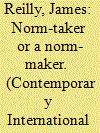

|
|
|
|
|
| Publication |
2011.
|
| Summary/Abstract |
As China expands its official development assistance (ODA) in Southeast Asia, is Chinese aid beginning to emulate international norms and practices or instead establishing its own distinct approach to development assistance? This essay argues that China's socialization into international norms varies with the thickness of the institutional environment. In Cambodia and Laos, China's aid program shows signs of alignment with international aid practices. At the regional level, however, China is beginning to act more like a norm-maker. Through expanding its financial support for select regional initiatives, Beijing is bolstering its ability to shape the norms and practices of regional developmental institutions. China's rising ODA in Southeast Asia poses a potential challenge to Australia's influence in the region, but also provides opportunities for greater diplomatic engagement and cooperation in support of regional development.
|
|
|
|
|
|
|
|
|
|
|
|
|
|
|
|
| 14 |
ID:
167835
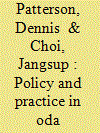

|
|
|
|
|
| Summary/Abstract |
South Korea is the only nation to become an important donor nation after being a recipient of Official Development Assistance (ODA) for several decades. In 2010, it became a member of the OECD's Development Assistance Committee, and while it has continued to use its experience as a former ODA recipient to inform its distribution practices, it also has evolved its ODA policies in response to changes in international norms and the imperatives associated with being a DAC-member nation. We know that, while policies may change, actual ODA disbursements—which nations are selected as recipients and receive ODA in what amounts—may lag or even remain unchanged. In this paper, we use the case of South Korea to determine how actual ODA disbursements change in response to policy changes. To accomplish this, we use a selection model to conduct a statistical analysis of South Korea's ODA disbursements using dyadic data from 1987 to 2016. Our results indicate that, while there has been continuity in terms of which nations receive South Korean ODA, there were also notable changes in its disbursements. Specifically, the ODA policy changes the South Korean government enacted did result in an altered profile of nations that were targeted by South Korea as ODA recipients.
|
|
|
|
|
|
|
|
|
|
|
|
|
|
|
|
| 15 |
ID:
159810
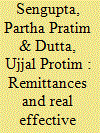

|
|
|
|
|
| Summary/Abstract |
Remittances in India have been growing rapidly since 1991. Most of the studies find that remittance has had a significant impact on real effective exchange rate (REER). It is imperative to evaluate the impact of a transfer such as remittance and aid on country’s competitiveness. This article is an attempt to investigate the impact of workers’ remittances and some selected macro-variables on REER of India using annual data from 1980–2015. The study conducted autoregressive distributive lag (ARDL) bound test co-integration approach to explore this long-run relationship. The ARDL bound test approach confirms significant long-run relationships among the selected variables at 1 per cent level of significance. In addition to this, the ARDL short-run error correction model implies that while REER may temporarily deviate from its long-run equilibrium, the deviations adjust towards the equilibrium level in the long run.
|
|
|
|
|
|
|
|
|
|
|
|
|
|
|
|
| 16 |
ID:
136050
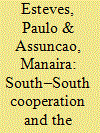

|
|
|
|
|
| Summary/Abstract |
This article discusses the transformation in development architecture, focusing on the role of emerging powers and the growing relevance of South–South cooperation (ssc). Drawing on a conceptual toolkit based on the work of Pierre Bourdieu, it aims to approach ssc as a narrative and to understand the processes of contestation that have turned international development into a battlefield since the end of the 1990s. The article argues that the emergence of ssc has contributed to decentring the field of international development, both in terms of the agents authorised to play and the practices considered legitimate. Within this process the Global Partnership for Effective Development Cooperation, led by the oecd’s Development Assistance Committee, and the United Nations Development Cooperation Forum have become two sites on the battlefield on which the borders of international development are being redrawn.
|
|
|
|
|
|
|
|
|
|
|
|
|
|
|
|
| 17 |
ID:
175659
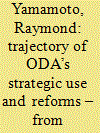

|
|
|
|
|
| Summary/Abstract |
Japan’s Official Development Assistance (ODA), one of the country’s most important foreign policy instruments, was until recently regarded as a prime example of a bureaucratic-led and fragmented decision-making system. Nevertheless, Prime Minister Abe Shinzō has held great control over ODA, using it for his political goals. This paper focuses on Abe’s efficient employment of ODA analysing the ODA-related administrative reforms he implemented. The analysis also looks at the ODA’s history to include reforms since the time of Prime Minister Nakasone Yasuhiro in order to unravel the roots of Abe’s influence. Yet, the analysis concludes that the prime minister’s increased authority is not followed by a static and predictable ODA strategy.
|
|
|
|
|
|
|
|
|
|
|
|
|
|
|
|
|
|
|
|
|